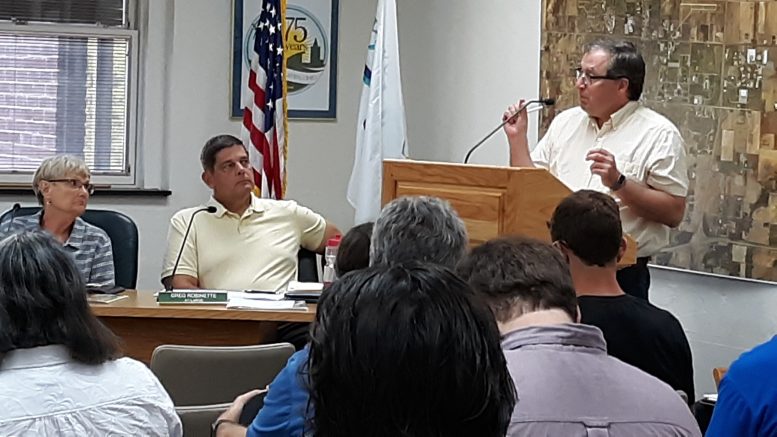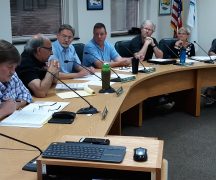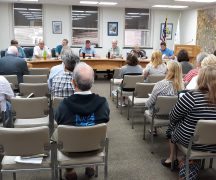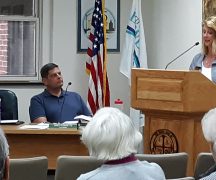By JAN LARSON McLAUGHLIN
BG independent News
Bowling Green City Council has bagged its plastic bag ban – at least for now.
Council voted 5 to 2 Monday evening to table the proposed ordinance that would ban single use plastic bags in the city.
Voting to table the ban were Mike Aspacher, Bruce Jeffers, Bill Herald, Mark Hollenbaugh and Greg Robinette. Voting to proceed with the ordinance were Sandy Rowland and John Zanfardino.
Jeffers proposed the tabling, which was voted on with no discussion.
“I believe plastic pollution is a serious issue,” he said. However, the state legislation is debating action that would preempt any municipal banning of plastic bags. So instead of proceeding with the ban, Jeffers suggested the city wait to see how the state handles the issue.
That did not sit well with the two council members who wished to proceed.
“As the person who introduced this, I’m really upset I had to hear about his through rumors,” Zanfardino said after the meeting.
“We spent seven months discussing this, and they table it for what the state might do,” Zanfardino said.
Rowland was also blindsided by the motion.
“I’m very shocked and very disappointed,” she said.
The decision to table the ordinance is contrary to the city’s vocal opposition with the state usurping home rule for municipalities.
“We have been saying that we don’t want the state to tell us what to do,” Rowland said.
The decision to table didn’t come easy, according to Aspacher, who is council president.
“I’m very conflicted with whether we should table it or proceed with it,” he said after the meeting. “It’s a tough call.”
To Aspacher, it wasn’t just the state – but also the local input that led to his vote to table.
“I believe from the comments we received from the business community, the support is not unanimous in the community,” he said.
But Aspacher said the time spent by council on the issue was not wasted.
“Even though we’ve tabled this legislation, I feel the time we spent discussing this was worthwhile,” he said. “We learned a lot about the impact of plastic on our ecosystem.”
Those discussions may lead city officials to create an educational component that will help local residents come up with alternatives to plastic bags.
After the meeting, Jeffers said he felt the ordinance should be tabled locally rather than trumped by the state. If the city would have adopted the plastic bag ban, and then the state overruled it at a later date, local business officials would be rightly perturbed.
“It would have aggravated a lot of people for nothing,” Jeffers said.
Robinette pointed out there was no need to rush the ordinance, since it would not have gone into effect until January 2021.
“The urgency is artificial,” said Robinette, who does not support the plastic bag ban.
The tabling of the ordinance does not throw out the legislation – but just puts it on hold.
“Every option is still available until the middle of next year,” whether that is passing the ban, rejecting it, or putting it on the ballot of a public vote, he said.
“Tabling it changes nothing,” Robinette said. “Let’s let the dust settle a little bit.”
It makes sense to wait to see if the state acts to take away the right of all municipalities to ban plastic bags, he added.
“I think it’s prudent to wait and see what the legislature does,” Robinette said. “This doesn’t close the door. Everything is still on the table.”
Herald, who has pushed to put the plastic bag ban on the ballot, said it may be tougher for the state to circumvent local action if the issue is approved by voters.
“The best way to do that would be put it before the voters,” he said. “The people want it on the ballot.”
Prior to council tabling the ordinance, Green Party leader Joe DeMare praised the body for addressing the problem of plastic.
“I’m glad Bowling Green is acting so quickly on this problem,” DeMare said of the ordinance which was on the agenda for its third reading.
But after the ordinance was tabled, DeMare’s praise was pulled.
“We’ve known about the threat of the state overriding this,” DeMare said, questioning why the city leaders wouldn’t stand up against climate change.
The public overwhelmingly acknowledges the impact of climate change, DeMare said. But Ohio leaders don’t seem to agree, since the state ranks 49th of 50 for green energy, Zanfardino added.





